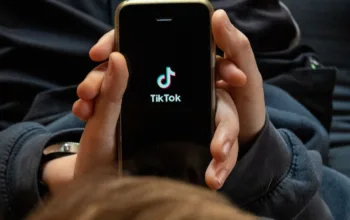
How prisoners stay intimate with romantic partners on the outside.
Many people who end up in relationships with prisoners say the same thing: They weren’t originally looking for love.
Jo, a military veteran and 44-year-old mother of three, was simply doing a good deed, she thought. Four years ago, she was dropping off old clothing at a friend’s church when she passed the prison ministries table. A volunteer urged her to send a warm holiday wish to an inmate. Looking at the options on PrisonPenPals.com, she chose a man named Ben, partly because he stated explicitly that he was only looking for friendship.
They struck up a correspondence and discovered a shared sense of humor and undeniable chemistry. Jo told me she would light up when she saw that she had a message from Ben and looked forward to them throughout the day. Two years later, I walked Jo down the aisle of the Oregon State Penitentiary. As a writer working on a book about how prisoners maintain intimate relationships, I spoke with Jo and Ben frequently; I was was one of two people to attend the ceremony.
Dan, a 49-year-old from Texas, was researching gay travel in Eastern Europe when he clicked, out of curiosity, on a confusing banner ad for GayPrisoners.net. (The site is a barrage of ancient clip art and analog graphics.) “I thought, ‘What in the world is that?’” But there were also profiles of prisoners on the site, and he was immediately drawn to Will’s. Will was imprisoned at a facility not too far away from where Dan lived. They wrote back and forth, Dan eventually visited, and they became a couple. When Dan visits Will in prison, he tells anyone who asks that he’s his uncle.
Jo and Dan weren’t looking for romance, and yet here they are. Jo recalls being terrified the first time she went to meet Ben face to face: “I’m voluntarily walking into a prison,” she remembers thinking. “Like, what the hell am I doing? People are trying to escape from this place. Why am I here on purpose?”
That’s what most outsiders don’t consider when thinking about prison love: the soul searching, the questioning, the identity crisis caused by falling in love with an incarcerated person. Plus, the judgment our society levies upon prisoners — that they are somehow unworthy and irredeemable — and that people like Jo levy, by extension, on themselves for loving these people.
You’re committing not only to the prisoner but also to an unorthodox lifestyle and mindset: You must take on the anxiety of knowing the dangers your loved one faces, from threats of violence to lockdown ; you have to accept a lack of physical intimacy, weekends given up for travel time, and constant phone checking so you don’t miss incoming calls.
Dating a prisoner can be expensive, too. I interviewed women and men whose monthly routine costs were in the hundreds, sometimes thousands, of dollars — money spent to maintain a sense of normalcy. These bills include exorbitantly priced collect phone calls; email and video messaging (internet access must be paid for); money for commissary accounts; plane tickets, rental cars, and gas for their loved ones to travel to the far-flung rural outposts where many prisons are situated; hotel rooms to visit for a few days at a time after making the journey; $20 bills to feed into the vending machine at visits; and prison-approved outfits to satisfy byzantine regulations (no jeans, no leggings, in some prisons).
But desire is a potent force, and couples find meaningful ways to express their love despite great distances and locked gates. Jo lives on the East Coast and gets out to Oregon about twice a year. But she cites the distance as her and Ben’s strength: “Take sex out of the equation and all the confusion that goes along with it. How often do you actually get to know someone without those distractions?”
Jo and Ben got to know each other through a year of letter writing, phone calls, and emails before ever meeting face to face, like a modern-day Heloise and Abelard. They emphasize and prioritize communication, because communication is really all they have. “Anytime one of us doesn’t feel right about something, we talk about it, no matter what it is,” Ben says.
For many people in relationships, that kind of communication can be rare. How often are we really listened to? How often do we find someone who gives us their undivided attention? How often do we get to feel that what we say to someone is the most interesting thing in someone else’s life — the best part of their day?
People in relationships with prisoners say they experience that feeling regularly. Prison relationships also force couples to be creative in how they convey their affections. Ben surreptitiously snuck a T-shirt into the mail for Jo so she could wear it and feel, metaphorically anyway, enveloped by him. Regina, a Colorado woman whose husband, Manuel, is serving a 24-year sentence in Colorado, says the two of them have developed a personal shorthand language: “When the wind blows, we say it’s one of us sending a kiss.”
“I have poems recorded that Manuel has written for me and read over the phone,” she adds, “and I play them when I need him but can’t immediately talk to him.” They formed a book club of two, reading and discussing titles like The Five Love Languages.
What about physical needs? Creative ingenuity plays a part. As Regina told me, “I write stuff to Manuel that would put that Fifty Shades of Grey lady to shame!” You can send racy lingerie photos, as long as your bits are covered. But you have to accept that your photos and letters will be monitored by corrections officers, as are phone calls and the inevitable practice of phone sex. One woman told me that prior to a steamy session, she directly addresses the guards she knows are listening in: “I tell them, you’re welcome!”
I’ve heard of fights being staged during visits so officers are distracted and couples can (very, very quickly) consummate their relationships. The inmate-produced podcast Ear Hustle details similar innovations at San Quentin prison where incarcerated couples provide cover for each other on an outdoor patio for momentary intimacy.
Some prisoners have reported purposely breaking prison rules to bump up their security level — this, in turn, requires all visitors of that person to be “non-contact,” affording them and their partner the privacy of a glass partitioned phone booth where couples can perform for each other and masturbate.
But the vast majority of the couples I’ve spoken with tend to play by the rules. Jo looks forward to her twice-yearly hugs with glee. At Ben’s security level, it’s all the couple is afforded: an embrace at the beginning and end of each visit. Conjugal visits, or overnight visits with privacy for married couples and their immediate family, are only available in Washington, California, New York, and Connecticut.
This article is adapted from an essay that originally ran on Medium.
Elizabeth Greenwood grew up in Worcester, Massachusetts. She teaches creative nonfiction at Columbia University. Playing Dead: A Journey Through the World of Death Fraud is her first book. Find her on Twitter @lizgreenwood4u.
First Person is Vox’s home for compelling, provocative narrative essays. Do you have a story to share? Read our submission guidelines, and pitch us at [email protected].
Read More
https://cdn.vox-cdn.com/community_logos/52517/voxv.png


